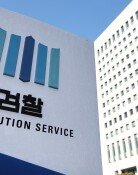Tripartite policy alliance under fire
Tripartite policy alliance under fire
Posted April. 16, 2001 19:10,
The ruling Millennium Democratic Party (MDP), the United Liberal Democrats (ULD) and the Democratic People`s Party (DPP) have declared the formal inauguration of their tripartite policy alliance in order to attain political stability through sustained political reform. There can be no objection to this move if the professed goal is achieved without fail. The point in question is whether they will accomplish their policy goal in view of the intrinsic character and limitations of the policy alliance. In a nutshell, we are very skeptical about the realization of the proposed goal. For the achievement of a policy partnership among the three parties, they should have identical ideologies. Yet the MDP, the ULD and the DPP have only loose ties with the equivocal rhetoric that they will pursue political cooperation and policy consultation. This is to say that the three parties will consult on policies case-by-case within the framework of the pro-government coalition partnership. For instance, if the three put side politically sensitive issues such as the revision of the National Security Law, this cannot be said to be a policy alliance. Against this backdrop, it is questioned how the three parties can promote people`s understanding and achieve consensus with regard to the crucial inter-Korean problems.
In addition, the trilateral union has yet to gain the confidence of the general public. This is because it is hard for them to justify the partisan deal and political morality in the process of formulating their alliance. In the case of the ULD, the small party has acquired the status of a floor negotiating group by ``borrowing`` lawmakers from the MDP, and many of its members were appointed as ministers in the Mar. 26 cabinet reshuffle. The DPP, with only two lawmakers, was given a cabinet portfolio. Such a development is open to public criticism that the cabinet posts were divided strategically for partisan machinations, regardless of whether the ministerial appointees were qualified or not.
Worse yet, DPP president Kim Yoon-Hwan was sentenced to a five-year prison term by the court in February after being accused of having taken a huge amount of money in kickbacks in return for party nominations of its parliamentary candidates and influence peddling. In this tripartite league led by the tarnished politician, how can the people have confidence and aspirations? Accordingly, the three-way alliance is largely characterized by a regional combination to gain numerical superiority and control the National Assembly, rather than a mutual necessity for policy collaboration. As a matter of course, the opposition Grand National Party lashed out at the allied pro-government forces for creating a power-sharing union that could rival the main opposition leader Lee Hoi-Chang with the ultimate goal of prolonging its grip on power. From this standpoint, the tripartite alliance is feared to deepen partisan confrontation and regional antagonism ahead of the 2002 presidential election, rather than bringing about political stability.
If this trend is kept up, the future of the nation is uncertain. The ruling camp ought to read correctly the people`s perceptions about the coalition camp`s camouflaged political maneuvering. The general public will see whether or not the joint announcement issued by the leaders of the three parties is substantiated as they pledged. If the tripartite union is truly designed in the best interests of the nation and the people, it should demonstrate this commitment with actions. The people will never trust the parties` promise at face value and need to see it translated into practice.



![“한동훈, 정치생명 걸고 무소속 출마해 평가받는 것 고려할만”[정치를 부탁해]](https://dimg.donga.com/c/138/175/90/1/wps/NEWS/IMAGE/2026/01/19/133186982.1.jpg)


![[한규섭 칼럼]왜 여당 지지율은 떨어지지 않는가](https://dimg.donga.com/c/138/175/90/1/wps/NEWS/IMAGE/2026/01/19/133189257.1.png)
